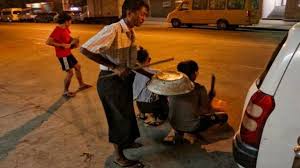Scores of people in Myanmar’s largest city honked car horns and banged on pots and pans Tuesday in the first known public resistance to the coup, a day earlier by the country’s military.
What was initially planned to take place for just a few minutes extended to more than a quarter-hour in several neighborhoods of Yangon.
“Beating a drum in Myanmar culture is like we are kicking out the devils,” said one participant who declined to give his name for fear of reprisals.
Several pro-democracy groups had asked people to make noise at 8 p.m. to show their opposition to the coup.
A senior politician and close confidante of Suu Kyi also urged citizens to defy the military through civil disobedience.
Win Htein, a leader of Suu Kyi’s National League for Democracy party, spoke Tuesday from a small party office in the capital, Naypyitaw, not far from where hundreds of lawmakers elected in the November vote were detained when the military seized power Monday in a lightning takeover.
“The curse of the coup is rooted in our country, and this is the reason why our country still remains poor. I feel sad and upset for our fellow citizens and for their future,” the former political prisoner said.
The military began to lift restrictions Tuesday on the hundreds of members of Parliament who had been confined at a guarded government housing complex, with the new government telling them to go back to their homes, party spokesman Kyi Toe said.
He said Suu Kyi was in good health at a separate location where she was being held and would stay there for the time being. His comments couldn’t immediately be confirmed.
The coup came as lawmakers gathered in the capital for the opening of a new parliamentary session. The military said the seizure was necessary because the government had not acted on the military’s unsubstantiated claims of fraud in November’s election, in which Suu Kyi’s party won a majority of seats. It claimed the takeover was legal under the constitution. The move was widely condemned abroad.
The coup highlights the extent to which the generals ultimately maintained control in Myanmar, despite more than a decade of talk about democratic reforms. Western countries had greeted the move toward democracy enthusiastically, removing sanctions they had in place for years.
It comes as Myanmar faces a growing coronavirus outbreak. As of Tuesday, it had over 140,300 confirmed cases, including about 3,100 deaths. The country has just received its first supply of vaccines from India.



